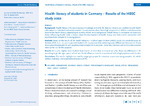Health literacy of students in Germany – Results of the HBSC study 2022
Sendatzki, Saskia
Helmchen, Ronja Maren
Moor, Irene
Sudeck, Gordon
Dadaczynski, Kevin
Rathmann, Katharina
Background: Health literacy (HL) encompasses knowledge and skills for dealing critically and confidently with health information in individual and social contexts. Current studies show that a high proportion of children and adolescents have limited health literacy, depending on aspects of their social background. Health literacy is considered an important factor influencing health. Little is known about the development of health literacy over time and its connection with psychosomatic complaints in young people.
Methods: Based on the results of the Health Behaviour in School-aged Children (HBSC) study, this article focusses on the level of HL in 11-, 13-, and 15-year-old students (N = 6,475) over time and taking social differences into account. Finally, the relationship between HL and psychosomatic complaints is analysed. Univariate, bivariate, and multivariate analyses were carried out for this purpose.
Results: At 24.4 %, slightly more students have low HL in 2022 than in 2017/18 (21.4 %). There are differences in HL according to gender, age, type of school, and family affluence. Low HL is associated with a high psychosomatic burden.
Conclusions: The results highlight the need for target group-specific measures to promote young people's HL, which address individual and organisational aspects of HL.
Dateien zu dieser Publikation

